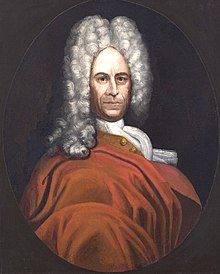Christian Wolff | |
|---|---|
 | |
| Born | 24 January 1679 |
| Died | 9 April 1754 (aged 75) |
| Education | University of Jena (1699–1702)[2] University of Leipzig (Dr. phil. habil., 1703) |
| Era | 18th-century philosophy |
| Region | Western philosophy |
| School | Age of Enlightenment Rationalism |
| Institutions | Leipzig University University of Halle University of Marburg |
| Thesis | Philosophia practica universalis, methodo mathematica conscripta (On Universal Practical Philosophy, Composed from the Mathematical Method) (1703) |
| Academic advisors | Ehrenfried Walther von Tschirnhaus Gottfried Leibniz (epistolary correspondent) |
| Notable students | Mikhail Lomonosov A. G. Baumgarten |
Main interests | Philosophical logic, metaphysics |
Notable ideas | Theoretical philosophy has for its parts ontology (also philosophia prima or general metaphysics) and three special metaphysical disciplines (rational psychology, rational cosmology, rational theology) Coining the philosophical term "idealism"[1] |
Christian Wolff (less correctly Wolf,[5] German: [vɔlf]; also known as Wolfius; ennobled as Christian Freiherr von Wolff in 1745; 24 January 1679 – 9 April 1754) was a German philosopher. Wolff is characterized as one of the most eminent German philosophers between Leibniz and Kant. His life work spanned almost every scholarly subject of his time, displayed and unfolded according to his demonstrative-deductive, mathematical method, which some deem the peak of Enlightenment rationality in Germany.[6]
Wolff wrote in German as his primary language of scholarly instruction and research, although he did translate his works into Latin for his transnational European audience. A founding father of, among other fields, economics and public administration as academic disciplines,[citation needed] he concentrated especially in these fields, giving advice on practical matters to people in government, and stressing the professional nature of university education.[citation needed]
- ^ Guyer, Paul; Horstmann, Rolf-Peter (30 August 2015). "Idealism". In Zalta, Edward N. (ed.). Stanford Encyclopedia of Philosophy. Stanford, California: Metaphysics Research Lab, Stanford University.
- ^ a b Robert Theis, Alexander Aichele (eds.), Handbuch Christian Wolff, Springer-Verlag, 2017, p. 442.
- ^ a b c d Brady Bowman, Hegel and the Metaphysics of Absolute Negativity, Cambridge University Press, 2013, p. 66.
- ^ David E. Cartwright, Schopenhauer: A Biography, Cambridge University Press, 2010, p. 192 n. 41.
- ^ Cite error: The named reference
EB1911was invoked but never defined (see the help page). - ^ Corr, Charles A. (1975). "Christian Wolff and Leibniz". Journal of the History of Ideas. 36 (2): 241–262. doi:10.2307/2708926. ISSN 0022-5037. JSTOR 2708926.